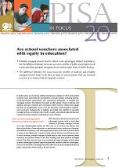|
PISA is an international study that was launched by the OECD in 1997. It aims to evaluate education systems worldwide every three years by assessing 15-year-olds' competencies in the key subjects: reading, mathematics and science. To date over 70 countries and economies have participated in PISA. |
 |
|
PISA: Measuring student success around the world |
Are school vouchers associated with equity in education?
|
|
|
|
||
What students know and what they can do |
Singapore: Building a strong and effective teaching force |
|
| The PISA 2009 assessment was taken by students in 65 economies worldwide. Aside from providing global rankings, analysts were able to find out which educational systems are offering students the best training for entering the workforce of tomorrow, and why. | A strong education system has enabled Singapore to develop a modern vibrant economy. Well trained and highly motivated teachers are central to its success. |


